-
 Bitcoin
Bitcoin $106,731.2224
-1.05% -
 Ethereum
Ethereum $2,444.9804
-1.20% -
 Tether USDt
Tether USDt $1.0003
0.01% -
 XRP
XRP $2.1882
0.09% -
 BNB
BNB $651.1435
-0.61% -
 Solana
Solana $148.3252
-2.09% -
 USDC
USDC $1.0000
0.01% -
 TRON
TRON $0.2787
0.55% -
 Dogecoin
Dogecoin $0.1598
-3.16% -
 Cardano
Cardano $0.5520
-2.43% -
 Hyperliquid
Hyperliquid $39.0960
-2.64% -
 Bitcoin Cash
Bitcoin Cash $516.9519
2.98% -
 Sui
Sui $2.7011
-2.95% -
 Chainlink
Chainlink $13.0582
-1.71% -
 UNUS SED LEO
UNUS SED LEO $8.9250
-2.53% -
 Stellar
Stellar $0.2359
-0.18% -
 Avalanche
Avalanche $17.3856
-3.73% -
 Toncoin
Toncoin $2.8095
-3.56% -
 Shiba Inu
Shiba Inu $0.0...01121
-1.95% -
 Litecoin
Litecoin $85.2795
-0.85% -
 Hedera
Hedera $0.1471
-2.15% -
 Monero
Monero $319.8004
1.12% -
 Dai
Dai $1.0001
0.01% -
 Ethena USDe
Ethena USDe $1.0001
0.02% -
 Bitget Token
Bitget Token $4.5344
-1.07% -
 Polkadot
Polkadot $3.3224
-2.96% -
 Uniswap
Uniswap $6.9697
-2.75% -
 Aave
Aave $266.1658
-2.25% -
 Pepe
Pepe $0.0...09414
-3.41% -
 Pi
Pi $0.4913
-3.29%
How to verify the validity of the Dogecoin wallet address?
Verify Dogecoin addresses by visually inspecting format, using blockchain explorers to check transaction history, and identifying red flags like suspicious activity; never send DOGE without thorough verification.
Feb 28, 2025 at 10:31 am
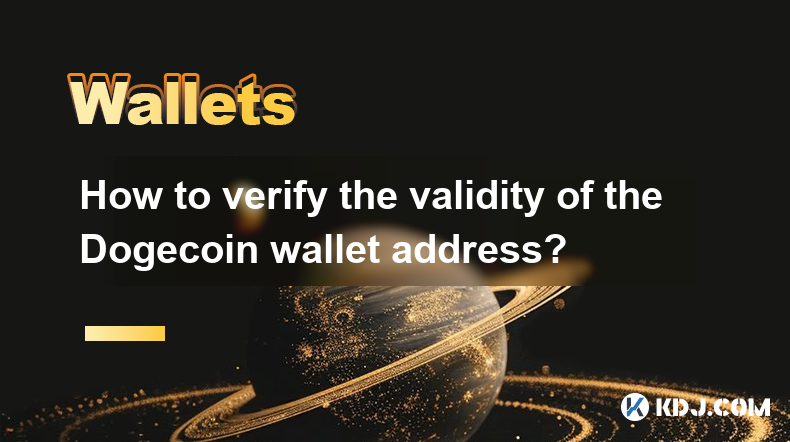
How to Verify the Validity of a Dogecoin Wallet Address?
Key Points:
- Understanding Dogecoin Addresses: Dogecoin addresses, like those of other cryptocurrencies, are unique alphanumeric strings representing a specific location on the Dogecoin blockchain where DOGE can be received. Verifying their validity involves confirming that the address conforms to the expected format and hasn't been flagged for suspicious activity. This doesn't guarantee the ownership of the address, only that it's a structurally sound Dogecoin address.
- Visual Inspection: A quick initial check involves looking for common characteristics of a valid Dogecoin address. This includes length, character set (alphanumeric with specific allowed characters), and the absence of obvious typos or unusual patterns. However, visual inspection alone is insufficient for complete verification.
- Using Blockchain Explorers: Blockchain explorers are online tools that provide a searchable interface to the Dogecoin blockchain. By inputting a Dogecoin address into an explorer, you can check if the address has ever received or sent DOGE. The presence of transaction history significantly increases confidence in its validity, though it doesn't guarantee the address hasn't been compromised or is currently being used maliciously.
- Checking for Red Flags: While a blockchain explorer will show transaction history, you should also be aware of red flags that might indicate an invalid or compromised address. These include a history of suspicious transactions, links to known scams or phishing sites, or an unusually high number of transactions in a short period.
- Social Proof (Limited Applicability): In some cases, social proof might offer a limited degree of verification. If the address is publicly associated with a known and reputable entity or individual, and that association is verifiable through independent sources, it strengthens confidence in the address's legitimacy. However, this is unreliable and should not be the primary method of verification.
Detailed Steps for Verifying a Dogecoin Wallet Address:
- 1. Visual Inspection of the Address:
Dogecoin addresses are alphanumeric strings, typically beginning with a "D" and containing a combination of uppercase and lowercase letters and numbers. They are usually between 34 and 36 characters long. A quick visual inspection is a crucial first step. Look for the following:
- Correct Prefix: Does the address start with a "D"? Addresses not starting with "D" are immediately suspect and almost certainly invalid Dogecoin addresses.
- Character Set: Check that the address only contains uppercase and lowercase letters (A-Z, a-z) and numbers (0-9). The presence of any other characters, such as symbols or spaces, indicates an invalid address.
- Length: The length should fall within the typical range (34-36 characters). Addresses significantly shorter or longer are likely invalid.
- Typos and Unusual Patterns: Carefully examine the address for any typos or unusual patterns. Repeated sequences of characters or seemingly random arrangements should raise concerns. Human error is a common cause of invalid addresses. Be extra vigilant when manually entering or copying addresses. Use copy-paste functionality whenever possible to minimize the risk of typos.
- Contextual Clues: Consider the source of the address. Did you receive it from a trusted source, such as a reputable exchange or a well-known Dogecoin wallet provider? Addresses obtained from untrusted sources, such as unsolicited emails or suspicious websites, should be treated with extreme caution.
Remember, visual inspection alone is not sufficient for complete verification. It serves as a preliminary check to weed out obviously invalid addresses. Always proceed to further verification steps. Even a visually correct address can be invalid or compromised. - 2. Utilizing Dogecoin Blockchain Explorers:
Dogecoin blockchain explorers are websites that allow you to search the Dogecoin blockchain for information about specific addresses. These explorers provide a valuable tool for verifying the validity of a Dogecoin address by checking its transaction history. Popular explorers include Dogecoinchain.info, and others.
- Inputting the Address: Go to a reputable Dogecoin blockchain explorer and enter the address you want to verify into the search bar.
- Checking Transaction History: The explorer will display the transaction history associated with the address. If the address is valid, you'll see a list of transactions, showing the amounts of DOGE sent and received, timestamps, and associated addresses. The absence of any transaction history doesn't necessarily mean the address is invalid, as it might be a newly created address that hasn't yet received any DOGE. However, the presence of a transaction history significantly increases confidence in its validity.
- Analyzing Transaction Details: Examine the transaction details carefully. Look for any suspicious patterns, such as unusually large transactions, frequent transactions to and from unknown addresses, or transactions linked to known scams or malicious activities.
- Cross-referencing Information: If possible, cross-reference the information obtained from one blockchain explorer with another. This helps to ensure the accuracy and reliability of the data.
- Understanding Limitations: While blockchain explorers provide valuable insights, they don't guarantee the address's legitimacy. A seemingly valid address with a transaction history could still be compromised or associated with fraudulent activities. Therefore, always exercise caution and critical thinking when evaluating the information provided by blockchain explorers.
- 3. Identifying Red Flags and Warning Signs:
Beyond simply checking for transaction history, you should be aware of potential red flags that may indicate an invalid or compromised Dogecoin address. These include:
- Association with Known Scams or Phishing Sites: If the address is linked to a known scam or phishing website, it's almost certainly invalid and should be avoided. Research the address online to see if it's been reported in connection with any fraudulent activities.
- Unusual Transaction Patterns: A high volume of transactions in a short period, especially if the transactions involve large amounts of DOGE, can be a warning sign. Similarly, a pattern of transactions to and from multiple unknown addresses should raise concerns.
- Lack of Transparency: If the address lacks any publicly available information or documentation, it’s more difficult to verify its legitimacy. Legitimate businesses and individuals often provide transparency regarding their cryptocurrency addresses.
- Negative Reputation: If the address has a negative reputation online, due to associations with scams or other questionable activities, it's crucial to exercise extreme caution.
- Suspicious Request for Funds: Be wary of any requests to send DOGE to an unfamiliar address, especially if the request is unsolicited or seems suspicious. Always independently verify the legitimacy of the request before sending any funds.
- 4. Social Proof (Use with Extreme Caution):
In certain limited situations, social proof might offer some degree of verification. This method is inherently unreliable and should never be used as the primary means of verification.
- Public Association with Reputable Entities: If the address is publicly associated with a known and reputable entity (e.g., a major Dogecoin exchange or a well-known individual in the Dogecoin community), and this association is verifiable through multiple independent sources, it adds a layer of confidence. However, this is not foolproof. Websites and social media accounts can be easily faked.
- Verification through Multiple Sources: If the address's association with a reputable entity is confirmed by multiple reliable sources, it strengthens the verification process. However, this is still not a guarantee of validity. It's possible for an address to be compromised even if it is publicly associated with a seemingly reputable entity.
- Limited Applicability: Social proof is primarily useful in specific contexts and should never be considered a reliable method for verifying the validity of a Dogecoin address in general. Relying solely on social proof can be extremely risky and lead to significant financial losses.
FAQs:
Q: What happens if I send Dogecoin to an invalid address?
A: Sending Dogecoin to an invalid address is irreversible. The Dogecoin will be lost, and you will not be able to recover it. The funds are essentially gone.
Q: Can I recover Dogecoin sent to an invalid address?
A: No, there is no mechanism to recover Dogecoin sent to an invalid address. The transaction is recorded on the blockchain, but the funds are inaccessible because the address doesn't exist or isn't associated with a functioning wallet.
Q: How can I avoid sending Dogecoin to an invalid address?
A: Carefully verify the address before each transaction. Use multiple verification methods as outlined above. Double-check the address multiple times, and consider using a trusted wallet or exchange that has built-in address verification features.
Q: Are all Dogecoin addresses equally valid?
A: No. While an address may be structurally valid (following the correct format), it may still be associated with malicious activity or be compromised. The validity of an address goes beyond its structural correctness. A seemingly valid address can still be a fraudulent address.
Q: What is the best way to verify a Dogecoin address?
A: The most reliable approach is a combination of visual inspection, using a reputable Dogecoin blockchain explorer to check transaction history, and identifying potential red flags. Never rely solely on a single verification method. Cross-checking information from multiple sources is crucial.
This detailed response expands upon the provided key points and offers a comprehensive guide to verifying the validity of a Dogecoin wallet address. Remember, caution and due diligence are crucial when handling cryptocurrencies to mitigate the risk of loss.
Disclaimer:info@kdj.com
The information provided is not trading advice. kdj.com does not assume any responsibility for any investments made based on the information provided in this article. Cryptocurrencies are highly volatile and it is highly recommended that you invest with caution after thorough research!
If you believe that the content used on this website infringes your copyright, please contact us immediately (info@kdj.com) and we will delete it promptly.
- Powell, Stablecoin Regulation, and Circle's Bold Move: A New York Minute on Crypto's Future
- 2025-07-02 02:30:12
- Ethereum Price, Tom Lee, and Bitcoin: A New Era for Crypto?
- 2025-07-02 02:30:12
- Hoskinson, Ripple, Cardano DeFi: A New Era of Collaboration?
- 2025-07-02 02:35:12
- BlockDAG, ALGO, and the Crypto Trends Shaping 2025
- 2025-07-02 01:50:12
- Cold Wallet, Token, Gains: Is CWT the Smartest Crypto Move?
- 2025-07-02 01:10:12
- Pi Coin's Rocky Ride: Support Levels, Recovery Timeline, and What the Experts Are Saying
- 2025-07-02 01:10:12
Related knowledge
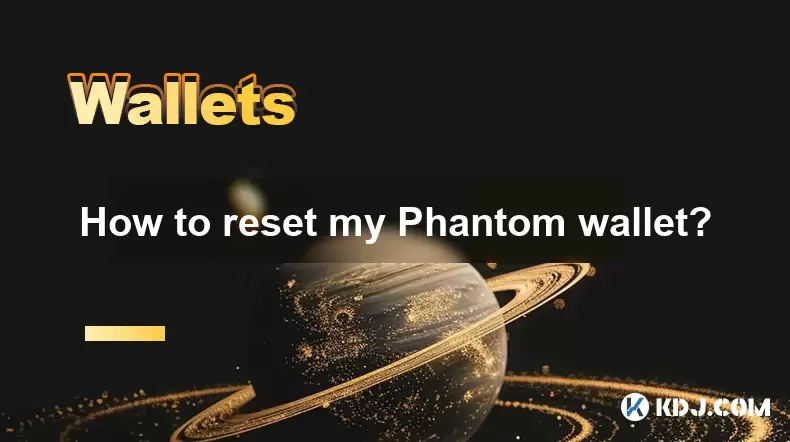
How to reset my Phantom wallet?
Jul 02,2025 at 12:36am
Understanding the Need for Resetting Your Phantom WalletIf you're using a Phantom wallet, you may encounter situations where resetting your wallet becomes necessary. This could be due to forgotten passwords, seed phrase issues, or account corruption. Phantom is a non-custodial wallet primarily used for interacting with the Solana blockchain, and it stor...
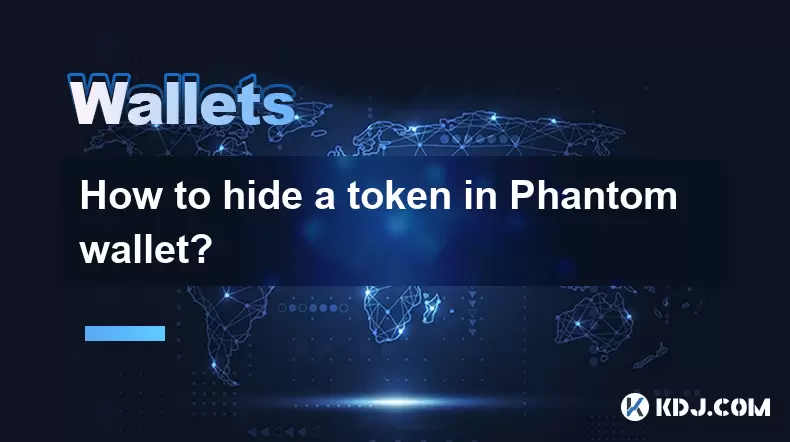
How to hide a token in Phantom wallet?
Jul 01,2025 at 05:49pm
Understanding the Phantom Wallet InterfacePhantom wallet is a popular non-custodial wallet used primarily for interacting with the Solana blockchain. It allows users to store, send, receive, and manage various tokens, including both fungible and non-fungible tokens (NFTs). Before attempting to hide a token, it's essential to understand how the wallet in...
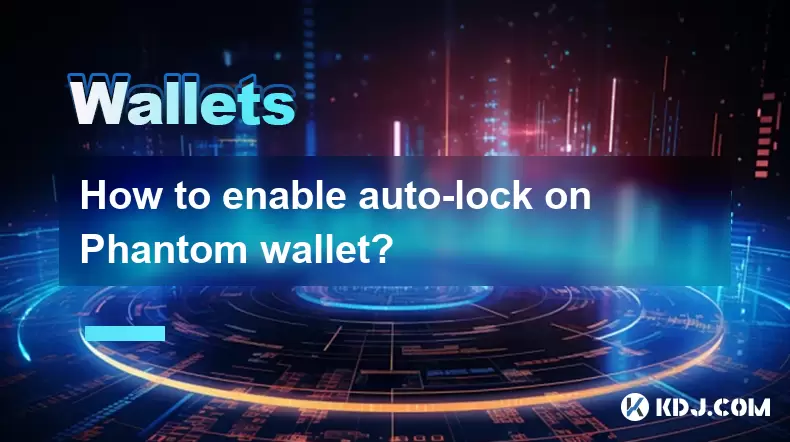
How to enable auto-lock on Phantom wallet?
Jul 01,2025 at 04:01pm
What is Auto-Lock in Phantom Wallet?Phantom wallet is a popular non-custodial cryptocurrency wallet used primarily for interacting with the Solana blockchain. One of its security features includes the ability to set an auto-lock timer, which ensures that the wallet locks itself automatically after a period of inactivity. Auto-lock enhances security by p...
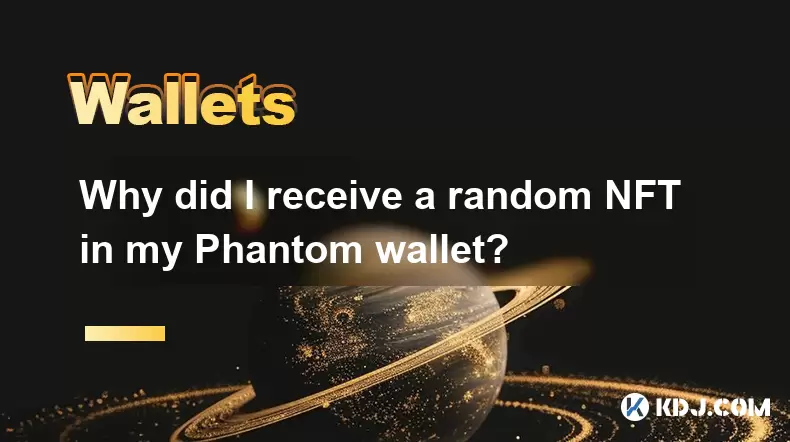
Why did I receive a random NFT in my Phantom wallet?
Jul 01,2025 at 09:00pm
Receiving an Unexpected NFT in Your Phantom WalletIf you've recently opened your Phantom wallet and noticed an unfamiliar NFT appearing in your collection, you're not alone. Many users have reported receiving random or unsolicited non-fungible tokens, often without any prior interaction with the project or sender. This phenomenon has become increasingly...
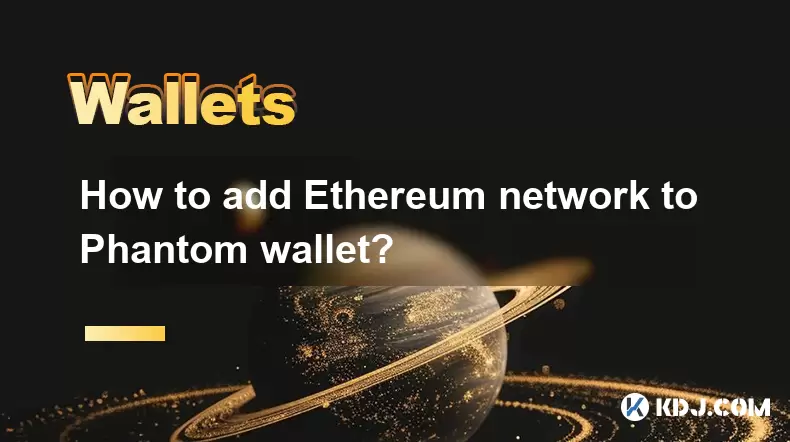
How to add Ethereum network to Phantom wallet?
Jul 02,2025 at 02:00am
Understanding Phantom Wallet and Ethereum CompatibilityPhantom wallet is a non-custodial wallet primarily designed for the Solana blockchain. It provides users with secure storage, sending, and receiving of Solana-based tokens and NFTs. However, many users wonder if they can integrate Ethereum-compatible networks into their Phantom wallet. While Phantom...
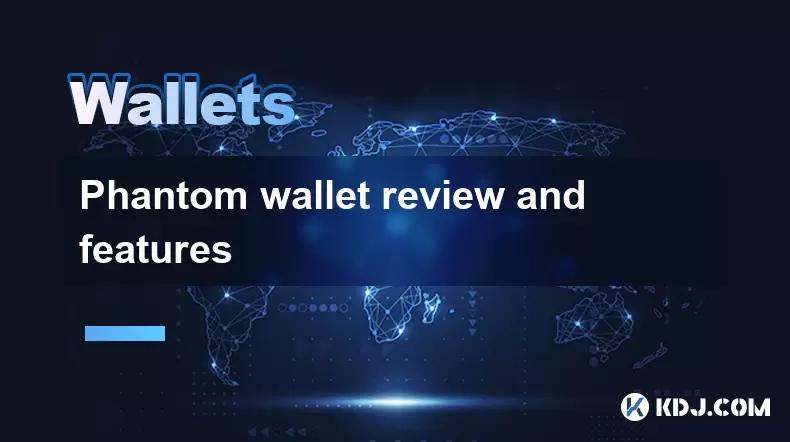
Phantom wallet review and features
Jul 02,2025 at 01:28am
What is Phantom Wallet?Phantom wallet is a non-custodial cryptocurrency wallet specifically designed for the Solana blockchain. It allows users to store, send, receive, and interact with decentralized applications (dApps) on the Solana network seamlessly. Unlike traditional wallets that may require intermediaries, Phantom ensures complete control remain...

How to reset my Phantom wallet?
Jul 02,2025 at 12:36am
Understanding the Need for Resetting Your Phantom WalletIf you're using a Phantom wallet, you may encounter situations where resetting your wallet becomes necessary. This could be due to forgotten passwords, seed phrase issues, or account corruption. Phantom is a non-custodial wallet primarily used for interacting with the Solana blockchain, and it stor...

How to hide a token in Phantom wallet?
Jul 01,2025 at 05:49pm
Understanding the Phantom Wallet InterfacePhantom wallet is a popular non-custodial wallet used primarily for interacting with the Solana blockchain. It allows users to store, send, receive, and manage various tokens, including both fungible and non-fungible tokens (NFTs). Before attempting to hide a token, it's essential to understand how the wallet in...

How to enable auto-lock on Phantom wallet?
Jul 01,2025 at 04:01pm
What is Auto-Lock in Phantom Wallet?Phantom wallet is a popular non-custodial cryptocurrency wallet used primarily for interacting with the Solana blockchain. One of its security features includes the ability to set an auto-lock timer, which ensures that the wallet locks itself automatically after a period of inactivity. Auto-lock enhances security by p...

Why did I receive a random NFT in my Phantom wallet?
Jul 01,2025 at 09:00pm
Receiving an Unexpected NFT in Your Phantom WalletIf you've recently opened your Phantom wallet and noticed an unfamiliar NFT appearing in your collection, you're not alone. Many users have reported receiving random or unsolicited non-fungible tokens, often without any prior interaction with the project or sender. This phenomenon has become increasingly...

How to add Ethereum network to Phantom wallet?
Jul 02,2025 at 02:00am
Understanding Phantom Wallet and Ethereum CompatibilityPhantom wallet is a non-custodial wallet primarily designed for the Solana blockchain. It provides users with secure storage, sending, and receiving of Solana-based tokens and NFTs. However, many users wonder if they can integrate Ethereum-compatible networks into their Phantom wallet. While Phantom...

Phantom wallet review and features
Jul 02,2025 at 01:28am
What is Phantom Wallet?Phantom wallet is a non-custodial cryptocurrency wallet specifically designed for the Solana blockchain. It allows users to store, send, receive, and interact with decentralized applications (dApps) on the Solana network seamlessly. Unlike traditional wallets that may require intermediaries, Phantom ensures complete control remain...
See all articles

























































































